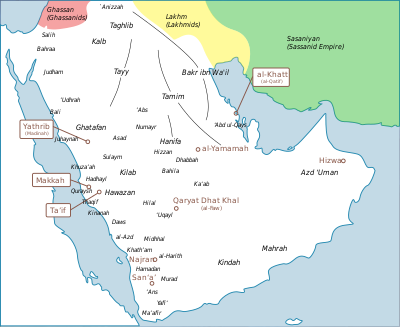Banu Hudhayl
| Hudhayl هذيل | |
|---|---|
| Mudari Arab tribe | |
 Banner of Banu Hudhayl at the Battle of Siffin | |
| Ethnicity | Arab |
| Nisba | Al-Hudhali |
| Location | Saudi Arabia, Jordan |
| Descended from | Hudhayl ibn Madraka |
| Branches |
|
| Religion | Paganism, later Islam |
Hudhayl or Hothail or Huthail (Arabic: هذيل) is an Adnanite tribe of western Saudi Arabia in Hijjaz. The tribe is known throughout the history for their talented poets and intellectuals. They are settled mainly in Saudi Arabia and a few thousands in Jordan, Egypt, Tunisia and Algeria.
Ancestry[]
The tribe traces a genealogical history backwards from their eponymous ancestor to Adam:
Hothail son of Madrakah son of Ilyas (Elijah) son of Madher son of Nazar son of Ma'ad son of Adnan son of Add son of Send son of Napyot[1] son of Ishmael[2][3] son of Abraham[4][5][6] son of Azar[7][8][9] (Terah) son of Nahor[10] son of Srooj[11] son of Ra'o[12] son of Phaleg[13] son of Aber[14] son of Shaleh[15][16][17] son of Arpheckshad[18] son of Sam son of Noah son of Lamek[19] son of Motoshaleh son of Edres (Enoch) son of Yared son of Mehlaiel son of Qenan son of Anosh son of Seth son of Adam
Branches[]

Banu Huthail are divided in two branches: Lihyan ibn Hothail and Sa'ad ibn Hothail.
Lihyan ibn Hothail[]
The descendants of Lihyan ibn Hothail who founded the Arab kingdom of Lihyan, and presently live in the desert between Mecca and Ta'if. They are now divided into two clans:
- Mohrez, subdivided into
- Alhosianat
- Aldhban
- Almosah
- Marer, subdivided into
- Albatahah
- Almasaibah
- Alnegimah
- Aloodah
Sa'ad ibn Hothail[]
There are presently four descendent clans of Sa'ad ibn Hothail:
- Beni, subdivided into
- Banu Omair
- Banu Mas'od
- Banu Mohaiya
- Banu Nobatah
- Fleet, subdivided into
- Al-Hatareshah
- Al-Afran
- Al-Eyad
- Hothail Albogom
- Banu Reshah
- Al-Matarefah
- Al-Sa'iedah
- Al-Moatan
- Al-Hatareshah
- Zohair, subdivided into
- Al-Srawnah
- Da'ad
- Sahelah
- Zolayfah.
- Jamil, subdivided into
- Alqarh
- Al-Mahmud
- Al-Kedwa (also known as Alkedawi)
- Al-Sawalima
- Al-Kabakiba
- Beni kaeb
- Bani yas
- Bani zayd
- Banu ziad
- Al-Hasasana
- Al zalifa
- Alshaeabin
- Altalahat
- Al khalid
- Albaqla
- Al hamid
- Al zaydan
- Sahila
- Aleabida
- Aljawabira
- Alnnjb
Arabian tribes that interacted with Muhammad[]
- Banu Kinanah
- Quraish[20][21]
- Banu Sulaym
- Banu Tamim
- Bani Asad
- Banu Thaqif
- Hawazin
- Ghatafan
Known Members[]
- Adel Aljubir
- Abdullah bin Masud
- Al-Masudi
Notes[]
- ^ Book of Genesis 25:12-16
- ^ Ishmael, Encyclopedia of the Qur'an
- ^ Azraqi, Akhbar Makkah, vol. 1, pp. 58-66
- ^ Abraham, Sarah and Hagar Archived 2011-07-25 at the Wayback Machine - James D. Brown
- ^ Genesis 16:1-6
- ^ Qur'an 2:127 to 136
- ^ Qur'an 6:74
- ^ Islamic view of Abraham
- ^ Qur'an 37:99–111
- ^ Luke 3:35
- ^ Book of Genesis11:20-23
- ^ Genesis 11:20
- ^ Genesis 10:25
- ^ Adamic language
- ^ Genesis 10:24
- ^ Genesis 11:12-13
- ^ Luke 3:36
- ^ Book of Genesis 10:22, 24; 11:10-13; 1 Chron. 1:17-18
- ^ Luke 3:37
- ^ Quraish
- ^ Quraysh (sura)
Further reading[]
- History Ibn Khaldun
- History Ibn al-Athir
- History Ibn Hisham
- History Al-Hamdani
- History Ibn Ishaq
- Kinship and marriage in early Arabia by \ Smith W. Robertson
- A universal history, from the earliest accounts to the present time by \ Universal
- The Koran, Commonly Called the Alcoran of Mohammed by George Sale, Savary
- A Short History of the Arabs by \ Francesco Gabrieli, Salvator Attanasio
- The March from Medina by \ John Walter Jandora
- Muhammad by \ Muhammad Zafrulla Khan
- Mohammed and the Rise of Islam by \ D. S. Margoliouth
- History of Arabia, Ancient and Modern by \ Andrew Crichton
External links[]
- https://web.archive.org/web/20080316215832/http://www.hathailly.com/vb/showthread.php?t=11324
- http://lahyan.net/vb/archive/index.php/t-24.html[permanent dead link]
- http://www.tmeme.com/vb/showthread.php?t=342
- https://web.archive.org/web/20080403064904/http://www.thearabhistory.com/mudar
- Arabian tribes that interacted with Muhammad
- http://sirah.al-islam.com/SearchDisp.asp?ID=113&SearchText=هذيل%20بن%20مدركة&SearchType=root&Scope=all&Offset=20&SearchLevel=QBE[permanent dead link]
- http://sirah.al-islam.com/SearchDisp.asp?ID=1672&SearchText=هذيل%20بن%20مدركة&SearchType=root&Scope=all&Offset=20&SearchLevel=QBE[permanent dead link]
- https://web.archive.org/web/20100222125145/http://sirah.al-islam.com/tree.asp?ID=1&t=book2
- https://web.archive.org/web/20080309174242/http://sirah.al-islam.com/Display.asp?f=rwd1012
- https://web.archive.org/web/20100122083326/http://sirah.al-islam.com/Display.asp?f=rwd1014
- https://books.google.com/books?id=baw9AAAAIAAJ&pg=PA155&dq=Lihyan&lr=
- https://books.google.com/books?id=CR9iAgUwmTEC&pg=PA338&dq=Lihyan&lr=
- https://books.google.com/books?id=SLvnnT31Du0C&pg=PA230&lpg=PA230&dq=%22Hodhail%22&source=bl&ots=GkklnIdE4X&sig=Kzt-WdMasrCFAZ9jPzm6dC2TGtU&hl=ar&sa=X&oi=book_result&resnum=6&ct=result#PPA230,M1
- http://www.familytreedna.com/public/J1arabproject/default.aspx
- https://web.archive.org/web/20090208095900/http://whitebook.com/p_1_en.htm
- Banu Hudhayl
- Tribes of Arabia
- Tribes of Saudi Arabia
- Semitic-speaking peoples
- Mudar
- History of Saudi Arabia
- Ethnic groups in the Middle East
- Bedouin groups
- History of the Arabian Peninsula
- Bedouins in Saudi Arabia